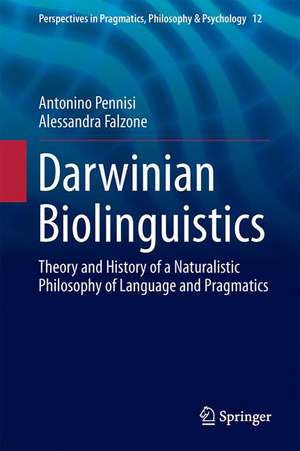Darwinian Biolinguistics: Theory and History of a Naturalistic Philosophy of Language and Pragmatics: Perspectives in Pragmatics, Philosophy & Psychology, cartea 12
Autor Antonino Pennisi, Alessandra Falzoneen Limba Engleză Hardback – 23 dec 2016
This book proposes a radically evolutionary approach to biolinguistics that consists in considering human language as a form of species-specific intelligence entirely embodied in the corporeal structures of Homo sapiens. The book starts with a historical reconstruction of two opposing biolinguistic models: the Chomskian Biolinguistic Model (CBM) and the Darwinian Biolinguistic Model (DBM). The second part compares the two models and develops into a complete reconsideration of the traditional biolinguistic issues in an evolutionary perspective, highlighting their potential influence on the paradigm of biologically oriented cognitive science. The third part formulates the philosophical, evolutionary and experimental basis of an extended theory of linguistic performativity within a naturalistic perspective of pragmatics of verbal language.
The book proposes a model in which the continuity between human and non-human primates is linked to the gradual development of the articulatory and neurocerebral structures, and to a kind of prelinguistic pragmatics which characterizes the common nature of social learning. In contrast, grammatical, semantic and pragmatic skills that mark the learning of historical-natural languages are seen as a rapid acceleration of cultural evolution. The book makes clear that this acceleration will not necessarily favour the long-term adaptations for Homo sapiens.
| Toate formatele și edițiile | Preț | Express |
|---|---|---|
| Paperback (1) | 561.98 lei 38-44 zile | |
| Springer International Publishing – 15 iul 2018 | 561.98 lei 38-44 zile | |
| Hardback (1) | 572.65 lei 38-44 zile | |
| Springer International Publishing – 23 dec 2016 | 572.65 lei 38-44 zile |
Din seria Perspectives in Pragmatics, Philosophy & Psychology
- 24%
 Preț: 628.50 lei
Preț: 628.50 lei - 24%
 Preț: 825.95 lei
Preț: 825.95 lei - 18%
 Preț: 959.98 lei
Preț: 959.98 lei - 18%
 Preț: 1023.28 lei
Preț: 1023.28 lei - 15%
 Preț: 656.43 lei
Preț: 656.43 lei - 18%
 Preț: 729.23 lei
Preț: 729.23 lei - 18%
 Preț: 955.08 lei
Preț: 955.08 lei - 15%
 Preț: 647.59 lei
Preț: 647.59 lei - 15%
 Preț: 586.05 lei
Preț: 586.05 lei - 15%
 Preț: 704.04 lei
Preț: 704.04 lei - 18%
 Preț: 904.11 lei
Preț: 904.11 lei - 18%
 Preț: 963.60 lei
Preț: 963.60 lei - 15%
 Preț: 662.16 lei
Preț: 662.16 lei - 15%
 Preț: 636.63 lei
Preț: 636.63 lei - 15%
 Preț: 528.80 lei
Preț: 528.80 lei - 15%
 Preț: 643.84 lei
Preț: 643.84 lei - 15%
 Preț: 634.32 lei
Preț: 634.32 lei - 18%
 Preț: 729.53 lei
Preț: 729.53 lei - 15%
 Preț: 653.46 lei
Preț: 653.46 lei - 15%
 Preț: 582.12 lei
Preț: 582.12 lei -
 Preț: 490.46 lei
Preț: 490.46 lei - 5%
 Preț: 721.40 lei
Preț: 721.40 lei - 18%
 Preț: 779.39 lei
Preț: 779.39 lei - 15%
 Preț: 705.65 lei
Preț: 705.65 lei - 18%
 Preț: 726.06 lei
Preț: 726.06 lei - 18%
 Preț: 725.61 lei
Preț: 725.61 lei - 18%
 Preț: 1420.24 lei
Preț: 1420.24 lei
Preț: 572.65 lei
Preț vechi: 715.81 lei
-20% Nou
Puncte Express: 859
Preț estimativ în valută:
109.58€ • 114.70$ • 91.20£
109.58€ • 114.70$ • 91.20£
Carte tipărită la comandă
Livrare economică 26 martie-01 aprilie
Preluare comenzi: 021 569.72.76
Specificații
ISBN-13: 9783319476865
ISBN-10: 3319476866
Pagini: 326
Ilustrații: IX, 301 p. 12 illus.
Dimensiuni: 155 x 235 x 19 mm
Greutate: 0.61 kg
Ediția:1st ed. 2016
Editura: Springer International Publishing
Colecția Springer
Seria Perspectives in Pragmatics, Philosophy & Psychology
Locul publicării:Cham, Switzerland
ISBN-10: 3319476866
Pagini: 326
Ilustrații: IX, 301 p. 12 illus.
Dimensiuni: 155 x 235 x 19 mm
Greutate: 0.61 kg
Ediția:1st ed. 2016
Editura: Springer International Publishing
Colecția Springer
Seria Perspectives in Pragmatics, Philosophy & Psychology
Locul publicării:Cham, Switzerland
Cuprins
Acknowledgements.- 1. Introduction.- Part one – History and State of the art.- 2. Chomsky and Biolinguistics.- 3. The last Chomsky and the Evolutionary Perspective.- 3. 4. The Update of the Biolinguistics Agenda.- 5. Another Biolinguistics History: From Aristotle to Darwin and Broca.-
Part two – Towards a Darwinian Biolinguistics.- 6. Comparing two Models: CBM vs DBM.- 7. The Nature of the Species-specificity of Human Language.- 8. Genetic Fundamentals.- 9. Morphological Fundamentals.- 10. Neurocerebral Fundamentals.- Part three – Extended Performativity: from brain Plasticity to Linguistic Pragmatics.- 11. Performance.- 12. Functional Plasticity.- 13. Evolutionary Plasticity.- 14. Bio-linguistic Plasticity and Origin of Language.- 15. The Boundaries of Biolinguistics.- 16. Pragmatics and Biolinguistics.- Bibliography.
Textul de pe ultima copertă
This book proposes a radically evolutionary approach to biolinguistics that consists in considering human language as a form of species-specific intelligence entirely embodied in the corporeal structures of Homo sapiens. The book starts with a historical reconstruction of two opposing biolinguistic models: the Chomskian Biolinguistic Model (CBM) and the Darwinian Biolinguistic Model (DBM). The second part compares the two models and develops into a complete reconsideration of the traditional biolinguistic issues in an evolutionary perspective, highlighting their potential influence on the paradigm of biologically oriented cognitive science. The third part formulates the philosophical, evolutionary and experimental basis of an extended theory of linguistic performativity within a naturalistic perspective of pragmatics of verbal language.
The book proposes a model in which the continuity between human and non-human primates is linked to the gradual developmentof the articulatory and neurocerebral structures, and to a kind of prelinguistic pragmatics which characterizes the common nature of social learning. In contrast, grammatical, semantic and pragmatic skills that mark the learning of historical-natural languages are seen as a rapid acceleration of cultural evolution. The book makes clear that this acceleration will not necessarily favour the long-term adaptations for Homo sapiens.
Caracteristici
Adopts a unique perspective for analyzing the nature and origin of language, and the biology of language Opens up a new evolutionary scenario in which structural and functional aspects of language are unified by biological constraints Offers a new and radically evolutionary approach to biolinguistics
